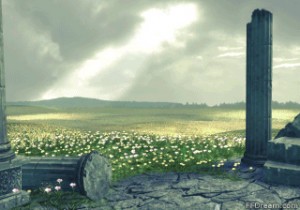Empty Chairs
by NorseGamer, HSM Publisher
One of my earliest (and fondest) memories is, as a three-year-old, marveling at the sheer size of the preschool playground I was standing on. It was an expanse that seemed to go on forever.
Decades later, as an adult in my thirties, I revisited that same playground.
It was tiny.
To this day, that moment sticks in my mind. There I was, in the same place I cherished, the echoes of those memories right there…and it proved the old aphorism true: you can’t go home again.
But can you go Home again?
I know that sounds like an odd question. But as I write this, I’m gearing up for E3. Getting ready to show off some PS4 stuff that we’ve been quietly cooking up for a long time now. From within the Home community, I’ve made it further than anyone else; so it’s been very interesting, in recent times, to occasionally sign into Home on my personal consumer kit (not my dev kit, which I practically live on these days) and go on walkabout through the old spaces, old games and old clothes. And then, further, to go back and re-read some of the thousands of articles archived on this site, reliving the echoes of discussions and debates that raged across the pages and years.
It has been fun.
So what it seems we have now are a growing number of empty chairs — and the echoes of what was.
 Five years, now. Five years of being in Home, at least for me. I know some of you have been here even longer. That’s a long time to spend on any particular game world, particularly in today’s rapid-fire age of a new IP shouting for attention every few seconds. Granted, successful MMO experiences keep people engaged for that long (or longer), and in this regard Home is not unusual. But it is odd, isn’t it, to set foot in old estates which have gone unused for years. Or to attempt to replay old games which once held throngs of people. Or to revisit public scenes that were once part of a daily routine.
Five years, now. Five years of being in Home, at least for me. I know some of you have been here even longer. That’s a long time to spend on any particular game world, particularly in today’s rapid-fire age of a new IP shouting for attention every few seconds. Granted, successful MMO experiences keep people engaged for that long (or longer), and in this regard Home is not unusual. But it is odd, isn’t it, to set foot in old estates which have gone unused for years. Or to attempt to replay old games which once held throngs of people. Or to revisit public scenes that were once part of a daily routine.
It can be argued that as we have grown, so has Home. A multitude of new scenes, games and virtual goods to enjoy. New voices making themselves known. New functionality to enjoy. And yet, in other ways, it feels like Home hasn’t grown; it’s still fundamentally the same experience it was when it began its closed beta back in 2007.
But are we the same people?
We talk about how Home has changed, how it could potentially do things better, recapture the old magic, et cetera — but have we forgotten to look at ourselves?
The myriad stories of Home are as varied as they are plentiful: for some, Home is a haven from issues in the real world. For others, it’s a place to simply socialize with friends in-between games. Or it’s a game unto itself. Or an opportunity (either successful or unsuccessful) for personal growth in some way. But it’s interesting to realize that, after this many years, some Home users really haven’t changed, while others have changed dramatically.
“Oh, for the good old days,” goes the lament. This, despite the fact that Home 2008 was downright primitive compared to where it is today. It’s much the same yearning to relive that emotional capture from childhood; you don’t necessarily want to go back to being a child, but you miss those days in the sun when it seemed like all there was was growth and future.
And this does raise an interesting question: are we, as Home users, emotionally prepared to refer to Home in nostalgic terms?
It’s inevitable, of course. But as human beings we have a natural fear of ends, and tend not to think about them. Stephen Hawking once told a funny anecdote about being asked to not talk about the end of the universe, because it might cause stock market instability. That gives you some idea of how we are, at heart, emotional creatures first and foremost!
Home still has some mileage in it, absolutely; though it was designed to be the social centerpiece of a console generation which is rapidly fading into the sunset, there is much there to enjoy, if one is so inclined. It is, frankly, a testament to the unique magic of Home that it continues to endure and hold a crowd after this many years. Let’s remember that what Home ultimately sells to us is each other — and it was conceived at a time when Facebook was barely off the ground, while YouTube and Twitter didn’t even exist. Sony’s goal of increasing socialization amongst gamers didn’t end with Home; it continues to evolve as the technology evolves.
(This is, of course, already upon us. Could anyone have conceived of the PS4’s Share feature as little as five years ago? Would a sprawling MMO such as GTA Online have even been considered feasible?)
 Home has affected people who took a deeper dive into its waters. Real lives directly affected by virtual ones. And if there is anything every Home user can take solace in, it’s the knowledge that while Home right now remains a unique experiment in bringing console gamers together, it is hardly the last attempt that will ever be made; it’s a foregone conclusion that, just like ShareFactory on the PS4, further such attempts at bringing people together will be made, refined and expanded upon. Home paved that road. And Home is still here, if you want to enjoy it.
Home has affected people who took a deeper dive into its waters. Real lives directly affected by virtual ones. And if there is anything every Home user can take solace in, it’s the knowledge that while Home right now remains a unique experiment in bringing console gamers together, it is hardly the last attempt that will ever be made; it’s a foregone conclusion that, just like ShareFactory on the PS4, further such attempts at bringing people together will be made, refined and expanded upon. Home paved that road. And Home is still here, if you want to enjoy it.
Yesterday might be gone, but let’s not trap ourselves in an emotional freeze-frame, lest we miss out on today. I’m not sure we can ever go Home again. But home is, ultimately, where the heart is.
Share
| Tweet |



 LinkedIn
LinkedIn Twitter
Twitter
Well written article, mon’fere. I believe Home is evolving rather than to just “go away”, so I’m not the one to say how something will end when there’s nothing that indicate this, regardless of how slow things may seem.
Speaks from the heart. Cheers!
:^/ Home was created for a demographic that seems mostly to shun it, but Home has attracted a different demographic that sticks around.
The lack of structure makes some feel directionless, while the free-form sandbox environment allows more imaginative folk to exercize creativity of their own.
;^) As for growing with Home, I certainly have. My transition from message board regular to MVP member to E3 participant would never have happened had it not been for PS Home.